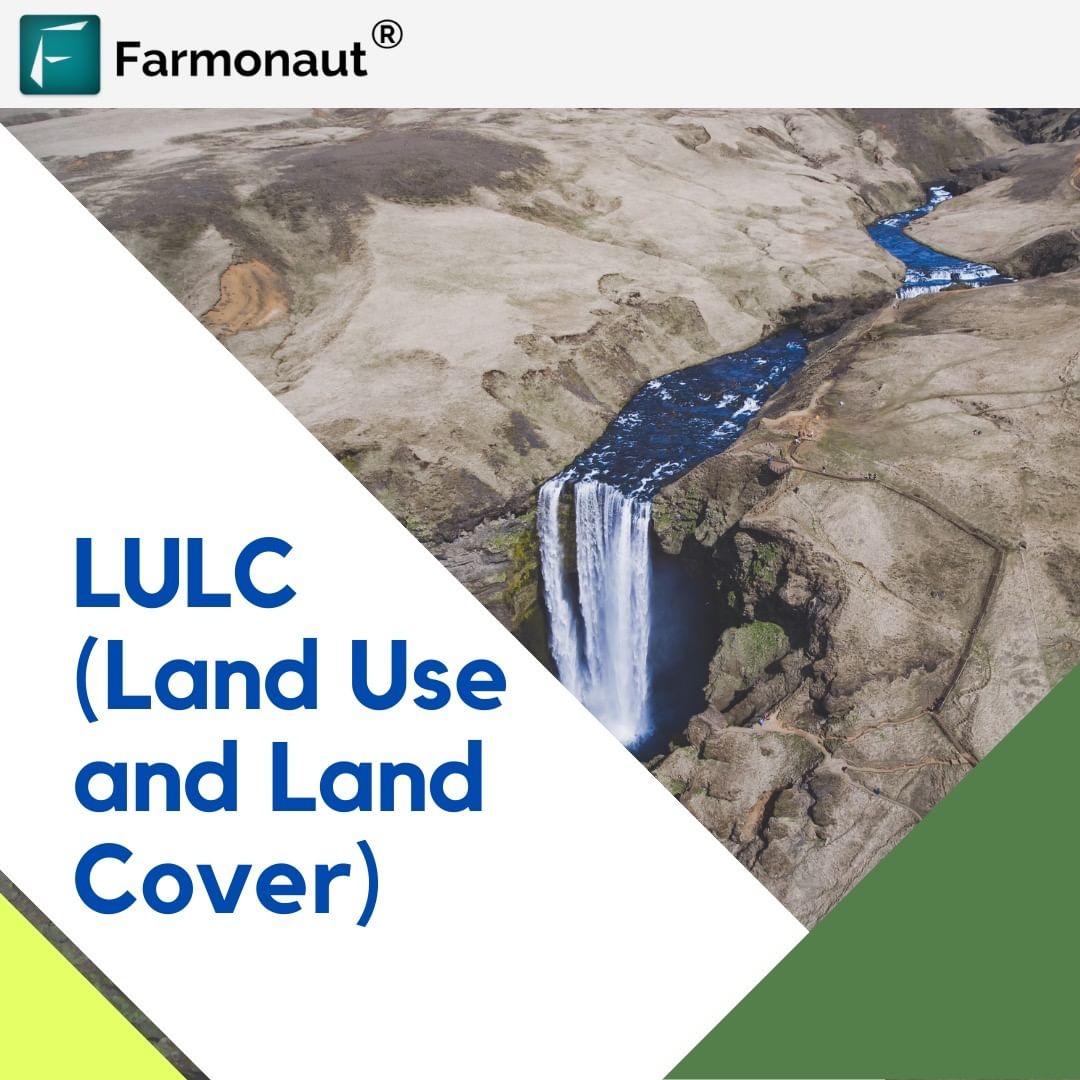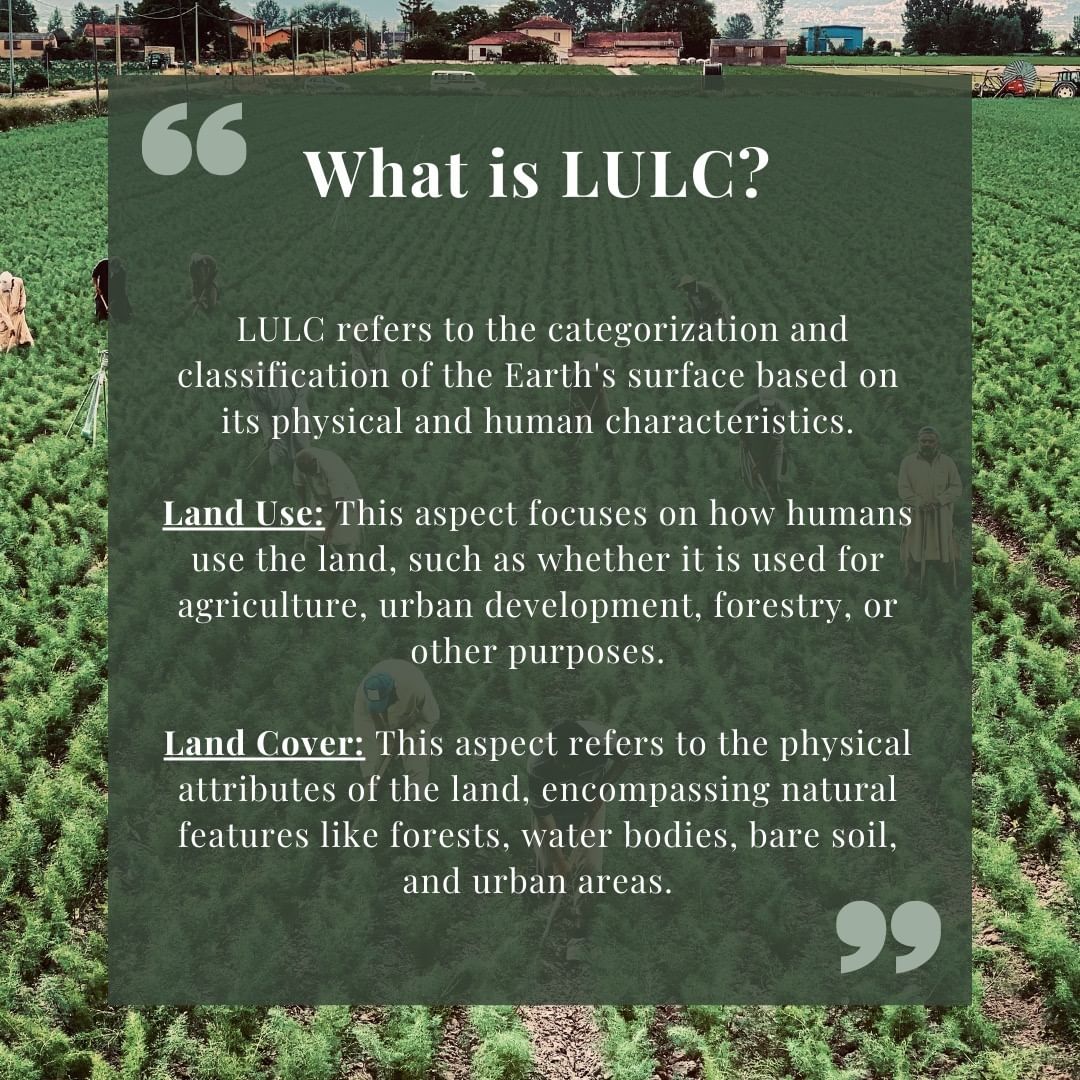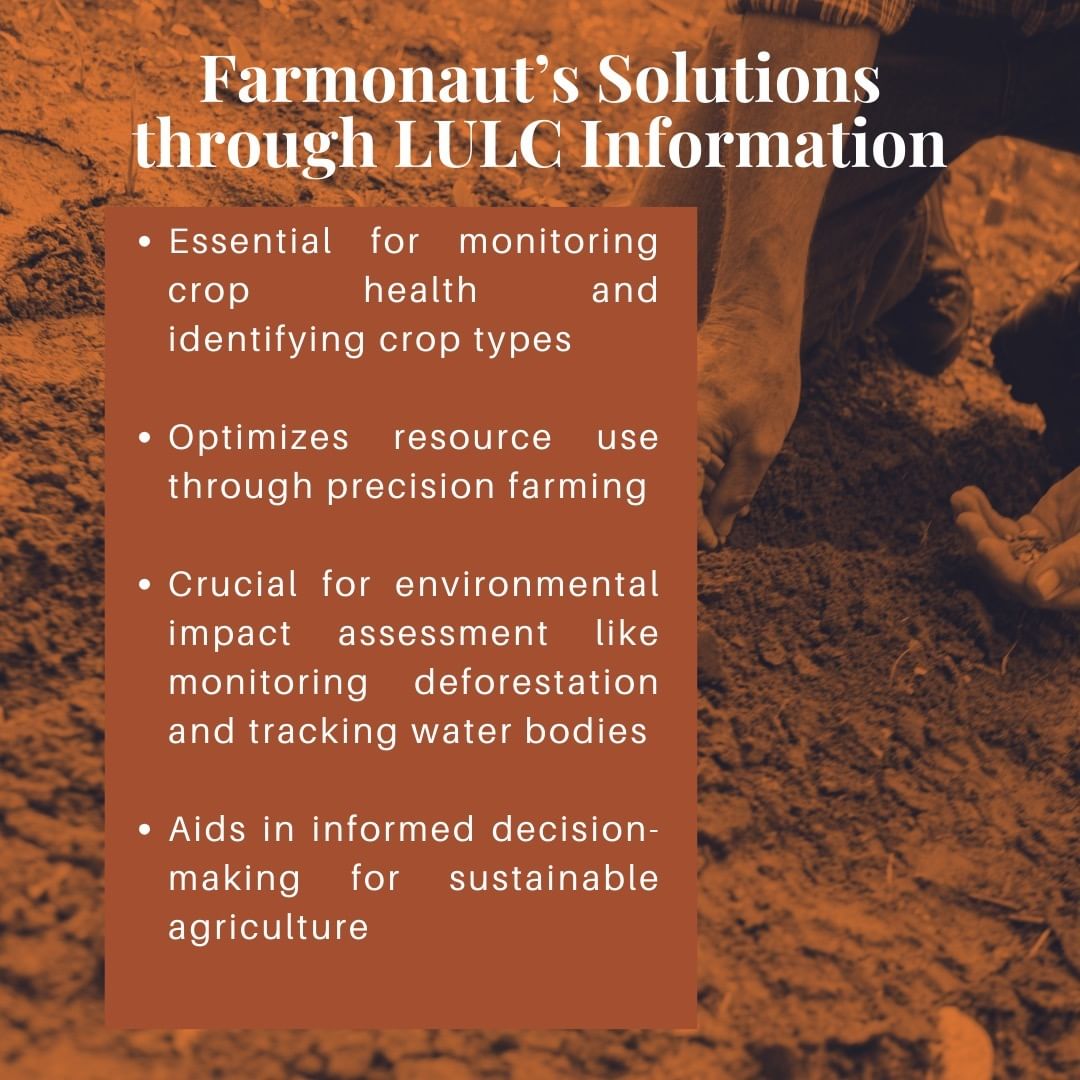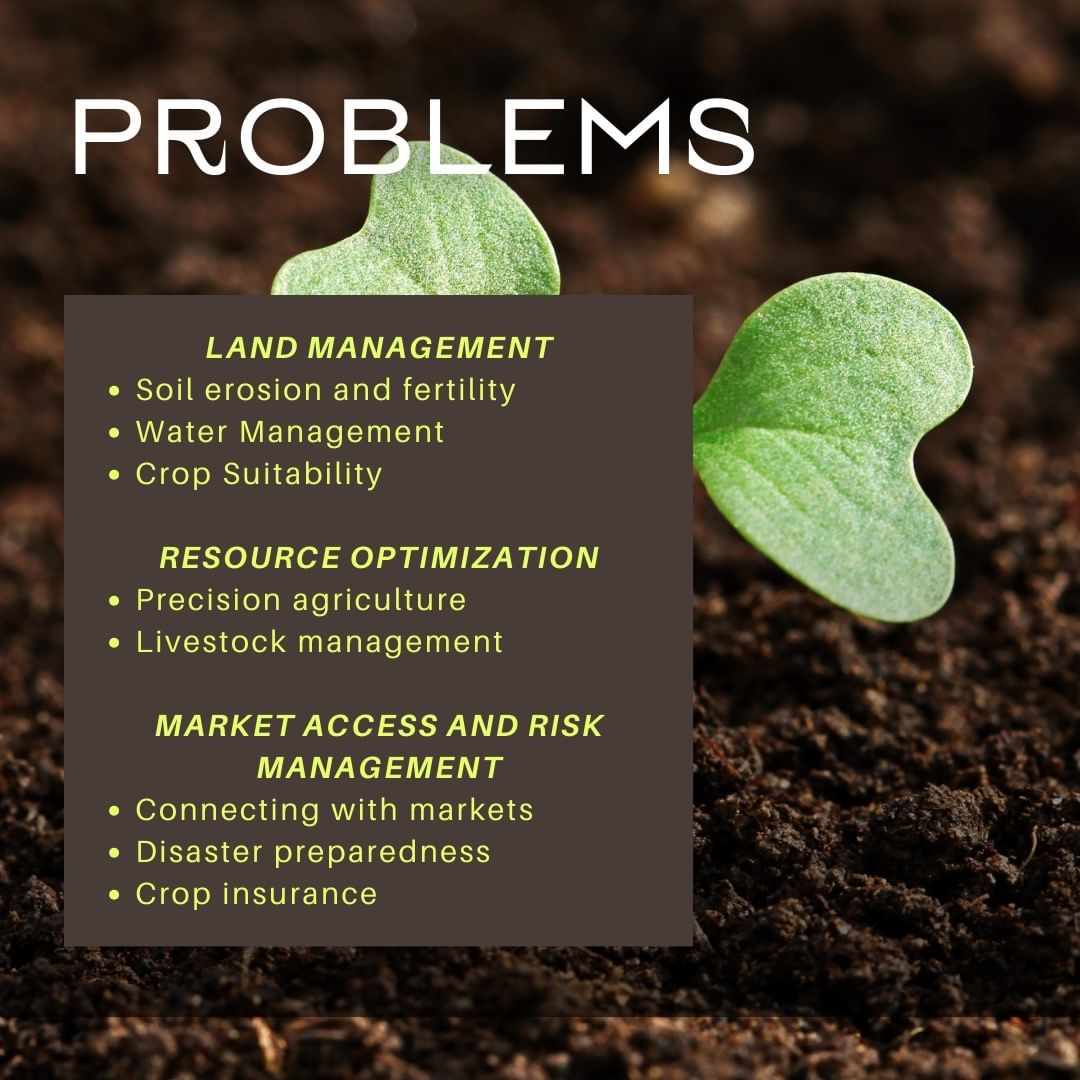
Revolutionizing Agriculture with LULC: Farmonaut’s Approach to Sustainable Farming
At Farmonaut, we are proud to be at the forefront of agricultural innovation, leveraging cutting-edge technology to promote sustainable farming practices. Today, we’re excited to discuss how we’re utilizing Land Use and Land Cover (LULC) data to enhance sustainability in agriculture and revolutionize the way farmers manage their land.
Understanding LULC: The Foundation of Sustainable Agriculture

Before we delve into how Farmonaut is utilizing LULC data, it’s crucial to understand what LULC means and why it’s so important in the context of agriculture.
Land Use and Land Cover (LULC) refers to the categorization and classification of the Earth’s surface based on its physical and human characteristics. This concept is divided into two main components:
- Land Use: This aspect focuses on how humans use the land, such as whether it is used for agriculture, urban development, forestry, or other purposes.
- Land Cover: This aspect refers to the physical attributes of the land, encompassing natural features like forests, water bodies, bare soil, and urban areas.
Understanding LULC is crucial for effective land management, environmental conservation, and sustainable agricultural practices. It provides valuable insights into the current state of our land resources and helps predict future changes.
The Importance of LULC in Agriculture
In the agricultural sector, LULC data plays a pivotal role in various aspects of farm management and decision-making processes. Here’s why LULC is so crucial for modern agriculture:
- Crop Suitability Analysis: LULC data helps determine which crops are best suited for specific areas based on soil type, topography, and climate conditions.
- Resource Management: It aids in the efficient allocation of resources such as water and fertilizers.
- Environmental Impact Assessment: LULC information is vital for monitoring the environmental impact of agricultural activities, including deforestation and soil erosion.
- Land Use Planning: It assists in making informed decisions about land use, helping to balance agricultural needs with environmental conservation.
- Climate Change Mitigation: LULC data contributes to understanding and mitigating the effects of climate change on agriculture.
Farmonaut’s LULC-Powered Solutions

At Farmonaut, we’ve recognized the immense potential of LULC data in revolutionizing agriculture. Our platform integrates LULC information to provide farmers and agribusinesses with powerful tools for sustainable and efficient farming. Here’s how we’re leveraging LULC data:
1. Crop Health Monitoring
Our satellite-based crop health monitoring system uses LULC data to provide accurate and timely information about crop conditions. By analyzing land cover changes, we can detect early signs of crop stress, pest infestations, or nutrient deficiencies. This allows farmers to take proactive measures to protect their crops and optimize yields.
2. Precision Agriculture
LULC information is crucial for implementing precision agriculture techniques. Our platform uses this data to create detailed maps of farm fields, identifying variations in soil type, moisture levels, and topography. This enables farmers to apply inputs like water, fertilizers, and pesticides precisely where they’re needed, reducing waste and environmental impact.
3. Resource Optimization
By understanding land use patterns and crop types, we help farmers optimize their resource use. Our AI-driven advisory system, Jeevn AI, uses LULC data along with other inputs to provide personalized recommendations for irrigation, fertilization, and other farm management practices.
4. Environmental Impact Assessment
LULC data is essential for monitoring the environmental impact of agricultural activities. Our platform tracks changes in land cover over time, helping farmers and policymakers understand the effects of farming practices on local ecosystems. This information is crucial for implementing sustainable farming methods and conservation strategies.
5. Informed Decision-Making
By providing comprehensive LULC information, we empower farmers to make informed decisions about crop selection, rotation patterns, and land use planning. This leads to more sustainable and profitable farming practices in the long run.
The Farmonaut Advantage: Satellite vs. Drone and IoT
While drones and IoT devices have their place in modern agriculture, Farmonaut’s satellite-based system offers unique advantages for farm monitoring. Here’s a comparison:
| Feature | Farmonaut Satellite System | Drone-based Monitoring | IoT-based Monitoring |
|---|---|---|---|
| Coverage Area | Large scale (Global) | Limited (Local) | Limited (Local) |
| Frequency of Data Collection | Regular (Every few days) | On-demand | Continuous |
| Initial Setup Cost | Low | High | Medium to High |
| Maintenance Required | Minimal | Regular | Regular |
| Weather Dependency | Low | High | Low |
| Data Processing | Automated | Manual/Semi-automated | Automated |
| Scalability | Highly Scalable | Limited Scalability | Moderately Scalable |
Implementing LULC-Based Strategies with Farmonaut

Now that we’ve explored how Farmonaut leverages LULC data, let’s dive into the practical strategies that farmers and agribusinesses can implement using our platform:
1. Land Management
Effective land management is crucial for sustainable agriculture. With Farmonaut’s LULC-based insights, farmers can:
- Combat Soil Erosion: By identifying areas prone to erosion, farmers can implement targeted conservation measures.
- Improve Soil Fertility: LULC data helps in understanding soil health trends, allowing for more effective fertility management.
- Optimize Water Management: Our platform provides insights into soil moisture levels and water bodies, enabling efficient irrigation planning.
- Enhance Crop Suitability: LULC information helps in selecting the most suitable crops for specific land areas, maximizing yields and minimizing environmental impact.
2. Resource Optimization
Farmonaut’s LULC-driven solutions enable farmers to optimize their resources in several ways:
- Precision Agriculture: By providing detailed land use maps, we enable precise application of inputs, reducing waste and environmental impact.
- Livestock Management: LULC data helps in identifying suitable grazing areas and managing pasture rotations effectively.
3. Market Access and Risk Management
Beyond on-farm applications, our LULC insights also contribute to broader agricultural management:
- Connecting with Markets: Understanding land use patterns helps in predicting crop yields and connecting farmers with potential buyers.
- Disaster Preparedness: LULC data aids in identifying areas at risk of natural disasters, allowing for better preparedness and risk mitigation.
- Crop Insurance: Our accurate land use information supports fair and efficient crop insurance processes.
The Future of Agriculture with LULC and Farmonaut
As we continue to innovate and expand our services, we envision a future where LULC data plays an even more significant role in shaping sustainable agricultural practices. Here are some exciting developments on the horizon:
1. Advanced AI Integration
We’re working on enhancing our AI capabilities to provide even more accurate and personalized recommendations based on LULC data. This will include advanced crop yield predictions, pest outbreak forecasts, and automated crop rotation suggestions.
2. Blockchain-Powered Traceability
By combining LULC data with blockchain technology, we aim to create a robust traceability system for agricultural products. This will allow consumers to trace their food from farm to table, promoting transparency and trust in the food supply chain.
3. Climate Change Adaptation
As climate change continues to impact agriculture, our LULC-based insights will become increasingly valuable for adapting farming practices. We’re developing models to help farmers anticipate and mitigate the effects of changing climate patterns on their crops.
4. Ecosystem Services Valuation
We’re exploring ways to use LULC data to quantify the ecosystem services provided by agricultural lands, such as carbon sequestration and biodiversity support. This could potentially open up new revenue streams for farmers through environmental credits.
Join the Farmonaut Revolution
At Farmonaut, we’re committed to making precision agriculture accessible and affordable for farmers worldwide. Our LULC-powered solutions are just one example of how we’re leveraging cutting-edge technology to promote sustainable farming practices.
We invite you to join us in this agricultural revolution. Whether you’re a small-scale farmer, a large agribusiness, or somewhere in between, Farmonaut has the tools and insights you need to optimize your operations and contribute to a more sustainable future.
Ready to experience the power of LULC-driven farming? Sign up for Farmonaut today and take the first step towards smarter, more sustainable agriculture.
Don’t miss out on the future of farming. Download our app today and start your journey towards sustainable, data-driven agriculture.
FAQs about LULC and Farmonaut
Q1: What is LULC, and why is it important for agriculture?
A1: LULC stands for Land Use and Land Cover. It’s a method of categorizing and classifying the Earth’s surface based on how the land is used (e.g., agriculture, urban development) and what covers it (e.g., forests, water bodies). LULC is crucial for agriculture because it provides valuable insights into land resources, helping farmers make informed decisions about crop selection, resource management, and sustainable practices.
Q2: How does Farmonaut use LULC data to benefit farmers?
A2: Farmonaut integrates LULC data into its platform to provide farmers with accurate information on crop health, soil conditions, and resource optimization. This data helps in implementing precision agriculture techniques, monitoring environmental impact, and making informed decisions about land use and crop management.
Q3: Can Farmonaut’s satellite-based system work for small farms?
A3: Absolutely! Farmonaut’s satellite-based system is designed to be scalable and accessible for farms of all sizes. Our affordable solutions make precision agriculture available to small-scale farmers, helping them optimize their operations and increase productivity.
Q4: How often is the LULC data updated on Farmonaut’s platform?
A4: The frequency of LULC data updates depends on the specific service package. Generally, we provide updates every few days, ensuring that farmers have access to recent and relevant information about their land and crops.
Q5: Is Farmonaut’s LULC data accurate for all types of terrain and climates?
A5: Farmonaut’s satellite-based system is designed to work across various terrains and climatic conditions. However, the accuracy may vary slightly depending on factors like cloud cover and specific local conditions. Our AI algorithms are continuously improving to enhance accuracy across all environments.
Q6: How does Farmonaut’s LULC-based system compare to drone monitoring?
A6: While drones can provide high-resolution images, Farmonaut’s satellite-based system offers several advantages. It covers larger areas, is less weather-dependent, requires no on-site equipment, and provides regular, automated updates. This makes it more cost-effective and easier to implement, especially for larger farms or those in remote areas.
Q7: Does Farmonaut offer API access to its LULC data?
A7: Yes, we do! Farmonaut offers API access to our satellite and weather data, including LULC information. This allows developers and businesses to integrate our data into their own systems. For more information, visit our API documentation.
Q8: How does Farmonaut ensure the privacy and security of farm data?
A8: At Farmonaut, we take data privacy and security very seriously. We use advanced encryption methods to protect all farm data and adhere to strict privacy policies. Our blockchain-based systems also ensure the integrity and traceability of data.
Q9: Can Farmonaut’s LULC-based insights help with sustainable farming practices?
A9: Absolutely! Our LULC-based insights are designed to promote sustainable farming practices. By providing accurate information about land use and cover, we help farmers optimize resource use, reduce environmental impact, and implement conservation strategies.
Conclusion: Embracing the Future of Agriculture with Farmonaut
As we’ve explored throughout this article, the integration of Land Use and Land Cover (LULC) data into agricultural practices is not just a technological advancement – it’s a paradigm shift in how we approach farming. At Farmonaut, we’re proud to be at the forefront of this revolution, providing farmers and agribusinesses with the tools they need to embrace sustainable, efficient, and profitable farming practices.
By leveraging LULC data through our advanced satellite-based system, we’re enabling farmers to:
- Make informed decisions about crop selection and land use
- Implement precision agriculture techniques
- Optimize resource use and reduce waste
- Monitor and mitigate environmental impacts
- Adapt to changing climate conditions
- Enhance overall farm productivity and sustainability
The future of agriculture is data-driven, and LULC information is a crucial piece of this puzzle. As we continue to innovate and expand our services, we remain committed to our mission of making precision agriculture accessible and affordable for farmers worldwide.
We invite you to join us on this exciting journey towards a more sustainable and productive agricultural future. Whether you’re a small-scale farmer looking to optimize your operations, a large agribusiness aiming to implement cutting-edge technology, or an agricultural researcher seeking valuable data insights, Farmonaut has the solutions you need.
Ready to experience the power of LULC-driven farming? Take the first step today:
- Download our app and start exploring our LULC-based insights
- Check out our API documentation to integrate our data into your systems
- For Android users, get our app on Google Play Store
- For iOS users, download from the App Store
- Explore our Satellite Weather API documentation for more advanced integrations
Together, let’s cultivate a greener, more sustainable tomorrow. Join the Farmonaut revolution today and be part of the future of agriculture!

For more information, follow us on social media and reach out to our support team:
- Email: [email protected]
- Phone: +91 6366026267
- Website: www.farmonaut.com
- YouTube: Farmonaut YouTube Channel
- Instagram: @farmonaut
Join us in revolutionizing agriculture, one farm at a time. With Farmonaut and LULC, the future of farming is here – and it’s more sustainable, efficient, and productive than ever before.